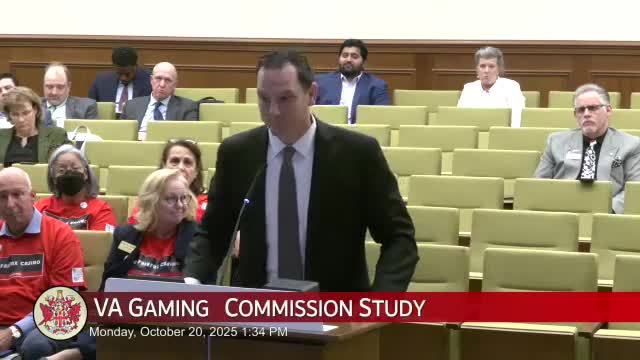Casino operators report strong local revenue and jobs; warn of threats from skill games and iGaming
Get AI-powered insights, summaries, and transcripts
Subscribe
Summary
Representatives of Caesars, Hard Rock, Rivers, Boyd, Cordish and others told the subcommittee their casinos have generated hundreds of millions in revenue, thousands of local jobs and community donations — but warned that unregulated skill machines and online gambling threaten jobs and tax bases.
Executives from Virginia’s existing and proposed casinos told the Joint Subcommittee on Gaming that brick-and-mortar properties have produced substantial local economic activity and jobs but that newer, unregulated forms of gambling present a significant threat to those gains.
Caesars, Hard Rock, Rivers and other operators detailed investments, job creation and community donations during a session the committee labeled “Casino Day.” The companies also urged lawmakers to consider enforcement and policy steps on skill games, sweepstakes-style “iGaming” and online advertising that operators said is diverting players and revenue.
What operators said about economic impact
- Caesars Virginia (Danville): Chris Albrecht, general manager, said the permanent Danville facility is “an $800,000,000 property” with a 320-room hotel, convention space and a 2,500-seat showroom. He told the panel the operator expects the city’s fiscal-year allocation tied to gaming to reach $35,000,000 and that the property drove visitation across the region.
- Hard Rock Bristol: President Ali Evangelista said the Bristol property employs roughly 1,300 team members, operates a 303-room hotel, more than 1,500 slot machines and 60-plus table games, and has recorded more than 5 million visitors since opening.
- Rivers Casino Portsmouth: General manager Antonio Perez said Rivers has “welcomed over 5,000,000 guests since opening in January 2023,” generated more than $800,000,000 in revenue and contributed “over $170,000,000 in taxes and fees to the city of Portsmouth and the Commonwealth.” He said the property employs more than 1,100 people.
- Cordish/Live Virginia (Petersburg) and Quartus: Penny Parayo and Rob Norton described temporary and permanent plans for Petersburg, including a planned temporary facility already cleared for occupancy and a longer-term master development with hotel, meeting space and entertainment venues. Cordish estimated that the temporary operation could begin to deliver public receipts quickly while the permanent project is completed.
Workforce, community partnerships and benefits
Operators emphasized local hiring, workforce training programs and charitable giving. Examples included dealer schools with community colleges (Portsmouth’s partnership with Tidewater Community College), job-training funds and scholarship programs, and company-led volunteer and charitable donations. Caesars said about 90% of jobs are full time and over 75% of staff are Virginia residents. Boyd and Pamunkey partners described workforce development efforts tied to Norfolk State University and Tidewater Community College.
Warnings about off-site and online competition
Several operators warned that unregulated “skill games” (slot-like machines appearing in noncasino retail locations) and sweepstakes-style iGaming apps threaten brick-and-mortar revenue, jobs and the tax base. Rush Street and Boyd representatives cited Pennsylvania and Michigan experience showing declines in casino employment and revenue after online gaming launched. Cordish and Rush Street urged the panel to let the five licensed casinos establish steady-state operations and a regulatory commission before expanding other licensed products.
Public-safety and problem-gambling concerns
Speakers noted industry efforts on responsible-gaming training, exclusion lists and working with the Lottery and state police on enforcement. Mark Stewart, speaking for industry interests on online gaming harms, cited an academic finding — relayed to the subcommittee — that online gambling can be substantially more harmful than traditional forms of gambling and pointed to sharp increases in calls to helplines and problem-gambling treatment in states that have legalized broad iGaming.
Operators’ ask
Operators asked lawmakers to focus on enforcement against illegal sweepstakes-style products, platform-level cooperation (app stores and social media companies), and careful consideration of any legal iGaming expansion because of the potential for job losses and cannibalization. Several operators offered to work with the subcommittee on technical solutions and enforcement approaches.
